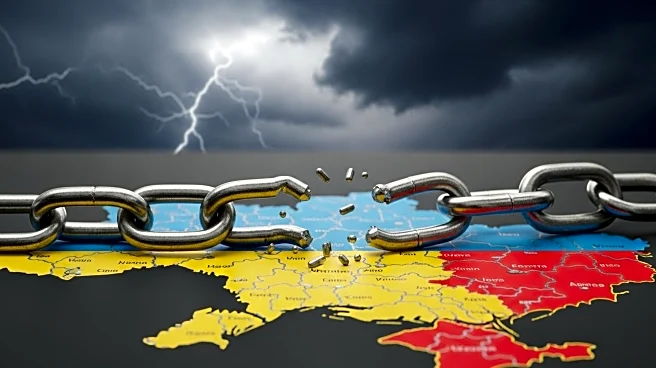What's Happening?
The United Nations has issued a warning regarding the escalating risk in Ukraine following intensified Russian attacks on the country's energy infrastructure. These attacks have resulted in widespread power outages, affecting thousands of residents in cities such as Kyiv and Zaporizhzhia. Ukrainian President Volodymyr Zelenskyy has hinted at a potential response to these strikes, which have left many without electricity and water. The UN Security Council has called for de-escalation and adherence to the U.N. Charter, emphasizing the need for peace and stability in the region. Despite these calls, the situation remains tense with ongoing hostilities and further attacks anticipated.
Why It's Important?
The escalation in Ukraine poses significant risks to regional stability and could have broader implications for international relations. The attacks on energy infrastructure not only disrupt daily life for Ukrainian citizens but also threaten the country's ability to sustain its economy and maintain public services. The potential for retaliatory actions by Ukraine could further exacerbate tensions, leading to a cycle of violence that may draw in additional international stakeholders. The situation underscores the importance of diplomatic efforts to prevent further escalation and protect civilian lives.
What's Next?
The international community, including the UN Security Council, is likely to continue monitoring the situation closely, urging both parties to seek peaceful resolutions. Ukraine may consider strategic responses to the attacks, potentially targeting Russian infrastructure as a form of deterrence. Meanwhile, humanitarian organizations may increase efforts to provide aid to affected areas, ensuring access to essential services like electricity and water. The coming days will be critical in determining whether diplomatic interventions can prevent further escalation.
Beyond the Headlines
The ongoing conflict in Ukraine highlights the vulnerability of critical infrastructure in wartime scenarios, raising questions about the protection of civilian resources during conflicts. The ethical implications of targeting energy systems, which directly impact civilian populations, may prompt discussions on international humanitarian laws and the conduct of war. Long-term, this situation could lead to shifts in global energy security policies and the prioritization of infrastructure resilience.











